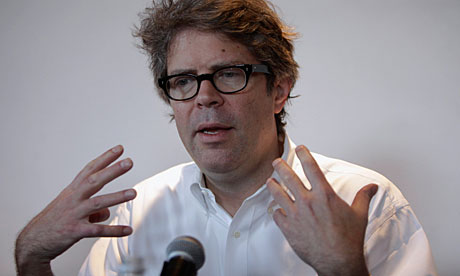
Jonathan Franzen has spoken of his fear that ebooks will have a detrimental effect on the world – and his belief that serious readers will always prefer print editions.
The acclaimed and bestselling novelist, who denies himself access to the internet when writing, was talking at the Hay festival in Cartagena, Colombia. "Maybe nobody will care about printed books 50 years from now, but I do. When I read a book, I'm handling a specific object in a specific time and place. The fact that when I take the book off the shelf it still says the same thing – that's reassuring," said Franzen, according to
the Telegraph.
"Someone worked really hard to make the language just right, just the way they wanted it. They were so sure of it that they printed it in ink, on paper. A screen always feels like we could delete that, change that, move it around. So for a literature-crazed person like me, it's just not permanent enough."
For serious readers, Franzen said, "a sense of permanence has always been part of the experience". "Everything else in your life is fluid, but here is this text that doesn't change," he continued. "Will there still be readers 50 years from now who feel that way? Who have that hunger for something permanent and unalterable? I don't have a crystal ball. But I do fear that it's going to be very hard to make the world work if there's no permanence like that. That kind of radical contingency is not compatible with a system of justice or responsible self-government."
The acclaimed author of Freedom and The Corrections – which are published as ebooks – has said in the past that "it's doubtful that anyone with an internet connection at his workplace is writing good fiction". He seals the ethernet port on his own computer to prevent him connecting to the internet while he writes, also removing the card so he is unable to play computer games and wearing noise-cancelling headphones to prevent distraction.
The disruption posed by technology is even voiced by one of his characters, Walter Berglund, in Freedom. "'This was what was keeping me awake at night,' Walter said. 'This fragmentation. Because it's the same problem everywhere. It's like the internet, or cable TV – there's never any centre, there's no communal agreement, there's just a trillion bits of distracting noise … All the real things, the authentic things, the honest things, are dying off.'"
Franzen said at Hay that "the combination of technology and capitalism has given us a world that really feels out of control".
"If you go to Europe, politicians don't matter. The people making the decisions in Europe are bankers," he said. "The technicians of finance are making the decisions there. It has very little to do with democracy or the will of the people. And we are hostage to that because we like our iPhones."
If printed books do become obsolete in the next 50 years, Franzen is pleased that at least he won't have to see it. "One of the consolations of dying is that [you think], 'Well, that won't have to be my problem'," he said. "Seriously, the world is changing so quickly that if you had any more than 80 years of change I don't see how you could stand it psychologically."

